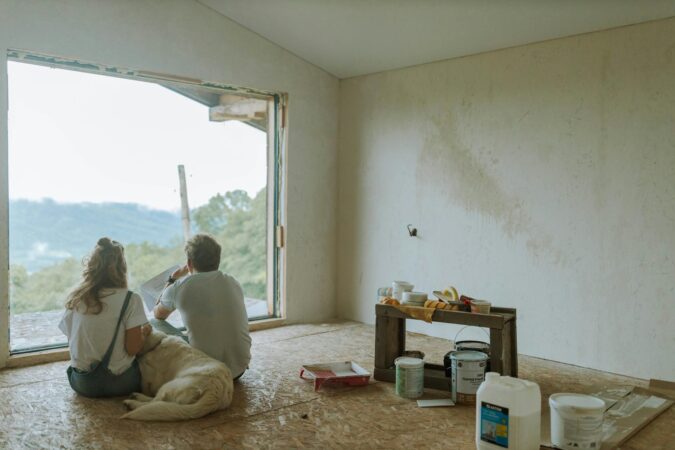This article may contain references to products or services from one or more of our advertisers or partners. We may receive compensation when you click on links to those products or services. Nonetheless, our opinions are our own.
The information presented in this article is accurate to the best of our knowledge at the time of publication. However, information is subject to change, and no guarantees are made about the continued accuracy or completeness of this content after its publication date.
- Choosing the Right Professional for Your Property Project
- Distinctions That Affect Budget, Scope, and Outcome
- The Role of Architects in Financially Impactful Projects
- Interior Designers
- Decorators
- Financial Considerations When Choosing Between Roles
- Making the Most of Your Investment
- Frequently Asked Questions
- Recommended Reads
Choosing the Right Professional for Your Property Project
Renovating a property or constructing a new one involves more than choosing fixtures or finishes, it begins with selecting the right professionals who can influence not just aesthetics, but also your project’s financial trajectory. Among the most frequently confused roles are those of architects, interior designers, and decorators, each offering a different level of service, licensing, and impact on budget.

Making a financially sound choice starts by distinguishing what each specialist offers and how their work aligns with your renovation scope, planning timeline, and long-term return on investment (ROI).
Distinctions That Affect Budget, Scope, and Outcome
The differences among these professionals aren’t simply about style, they affect structural decisions, code compliance, and how funds are allocated across phases of a project.
| Professional | Primary Focus | Licensing Required | Average Cost Impact | Ideal For |
|---|---|---|---|---|
| Architect | Structural design, construction planning | Yes | High | New builds, additions, structural changes |
| Interior Designer | Spatial planning, functionality, materials | Often | Medium | Renovations, layout improvement, usability |
| Decorator | Visual styling and furnishings | No | Low | Cosmetic updates, staging, surface aesthetics |
The Role of Architects in Financially Impactful Projects
Architects are licensed professionals trained to design buildings and oversee structural planning, ensuring compliance with local codes and long-term safety standards. Their responsibilities extend well beyond design, they coordinate zoning reviews, technical drawings, and the structural aspects that make construction viable.
When Architectural Involvement Is Financially Justified
- Structural Modifications: Load-bearing walls, expansions, or new construction projects.
- Legal Compliance: Avoid regulatory penalties and costly redesigns by ensuring upfront compliance with zoning and permit laws.
- Long-Term ROI: Smart architectural decisions can increase resale value through layout efficiency, sustainability, and visual appeal.
Architect fees usually range from 5% to 15% of construction costs, depending on complexity and location. Although their services represent a larger investment, their input can prevent expensive errors and unlock value over time.
Voted "Best Overall Budgeting App" by Forbes and WSJ
Monarch Money helps you budget, track spending, set goals, and plan your financial future—all in one app.
Get 50% OFF your first year with code MONARCHVIP
Interior Designers
Interior designers specialize in crafting functional, aesthetically pleasing environments. Their training often includes space planning, materials sourcing, and project coordination, making them valuable collaborators in both residential and commercial settings.
Where Designers Add Value
- Layout Efficiency: Reorganizing floor plans can maximize square footage without expanding the footprint.
- Finish Selections: Advising on materials, color schemes, and lighting plans tailored to both style and budget.
- Vendor Coordination: Designers often manage contractors, furniture orders, and installation schedules, saving both time and money.
Most designers charge either hourly (ranging from $75 to $200/hour) or a flat fee, with pricing influenced by experience and project scope. In projects where ROI is a priority, such as bathroom or kitchen remodels, interior designers can substantially enhance property value.
Decorators
Decorators enter a project once foundational and spatial work is complete. Their expertise lies in selecting furnishings, accessories, and color schemes that reflect a desired mood or theme. While they are not involved in layout or structure, their input can significantly elevate visual presentation, especially in properties listed for sale.
Strategic Use of a Decorator
- Home Staging: Effective decoration improves first impressions during showings, potentially reducing days on market and boosting offers.
- Low-Cost Transformation: For budget-conscious upgrades, decorating can refresh a space without engaging in construction.
- Brand Consistency (for commercial spaces): Decorators can align a space with a business’s visual identity, creating a cohesive customer experience.
Decorators typically work on a flat-fee or hourly basis, with fees starting around $50/hour and increasing with experience or project size.
Financial Considerations When Choosing Between Roles
Selecting the appropriate professional depends on your project goals, budget, and risk tolerance. Here’s how to evaluate options based on financial impact:
| Scenario | Recommended Professional | Budget Implication | Value Added |
|---|---|---|---|
| New construction | Architect | High | Ensures structural integrity and permits |
| Layout reconfiguration | Interior Designer | Medium | Enhances functionality, ROI potential |
| Cosmetic update or staging | Decorator | Low | Increases buyer appeal, short-term value |
Making the Most of Your Investment
In real estate and renovation, decisions should be made with both aesthetic goals and financial performance in mind. Collaboration between professionals, when warranted, can yield optimal results. For instance, architects and designers often work together on major renovations, while decorators may step in toward project completion to ensure visual continuity.
Whether you’re renovating for resale, upgrading for personal use, or building for the long term, investing in the right expertise early can prevent waste and drive tangible returns.
Frequently Asked Questions
What is the cost difference between hiring an architect and a designer?
Architects typically charge a percentage of the total construction cost, whereas designers may charge a flat fee or hourly rate. The architect’s fee structure is aligned with regulatory and structural responsibilities, making their services more expensive, especially for complex builds.
Do I need an architect for a home remodel?
Not always. If structural changes are minimal and permits are not required, a designer may suffice. However, for any load-bearing modifications, new additions, or code-driven projects, an architect is typically necessary.
Can hiring a decorator improve property value?
Decorators enhance presentation, which is especially useful when preparing a property for sale. A well-styled home can attract more competitive offers and reduce time on market.
Are interior designers licensed professionals?
Licensing requirements vary by region. Many states in the U.S. require certification for interior designers, particularly when projects involve commercial codes or public safety.
How do I decide which professional to hire first?
Consider the scope of your project. If you’re starting from scratch or modifying structure, consult an architect. For layout and material improvements, a designer is ideal. If your project is purely aesthetic, a decorator may be the most cost-efficient option.

Reviewed and edited by Albert Fang.
See a typo or want to suggest an edit/revision to the content? Use the contact us form to provide feedback.
At FangWallet, we value editorial integrity and open collaboration in curating quality content for readers to enjoy. Much appreciated for the assist.
Did you like our article and find it insightful? We encourage sharing the article link with family and friends to benefit as well - better yet, sharing on social media. Thank you for the support! 🍉
Article Title: What’s the Difference Between Architects, Designers and Decorators?
https://fangwallet.com/2025/06/24/home-design-professionals/The FangWallet Promise
FangWallet is an editorially independent resource - founded on breaking down challenging financial concepts for anyone to understand since 2014. While we adhere to editorial integrity, note that this post may contain references to products from our partners.
The FangWallet promise is always to have your best interest in mind and be transparent and honest about the financial picture.
Become an Insider

Subscribe to get a free daily budget planner printable to help get your money on track!
Make passive money the right way. No spam.
Editorial Disclaimer: The editorial content on this page is not provided by any of the companies mentioned. The opinions expressed here are the author's alone.
The content of this website is for informational purposes only and does not represent investment advice, or an offer or solicitation to buy or sell any security, investment, or product. Investors are encouraged to do their own due diligence, and, if necessary, consult professional advising before making any investment decisions. Investing involves a high degree of risk, and financial losses may occur including the potential loss of principal.
Source Citation References:
+ Inspo
There are no additional citations or references to note for this article at this time.












































